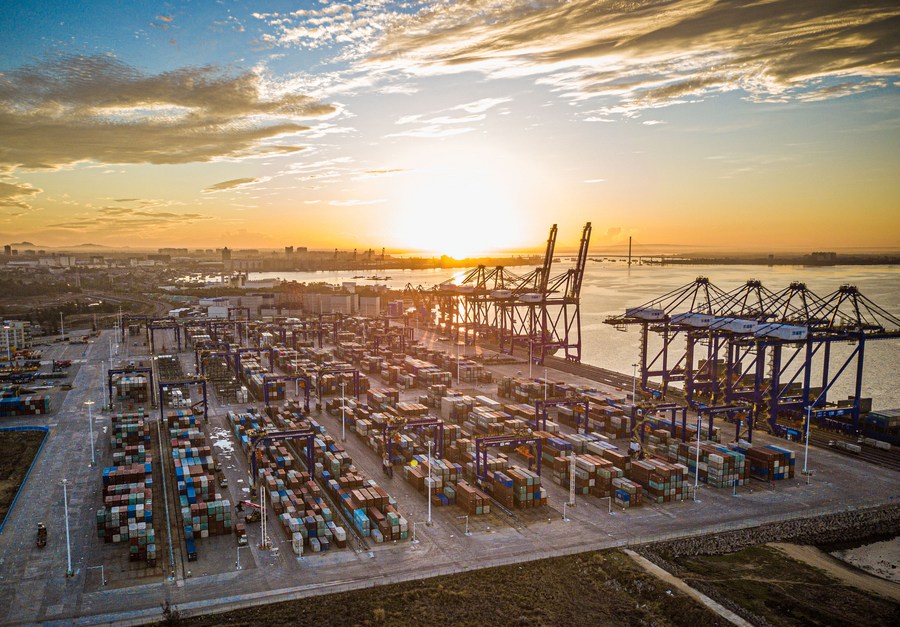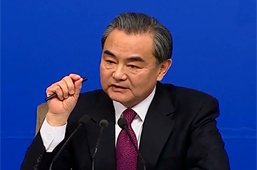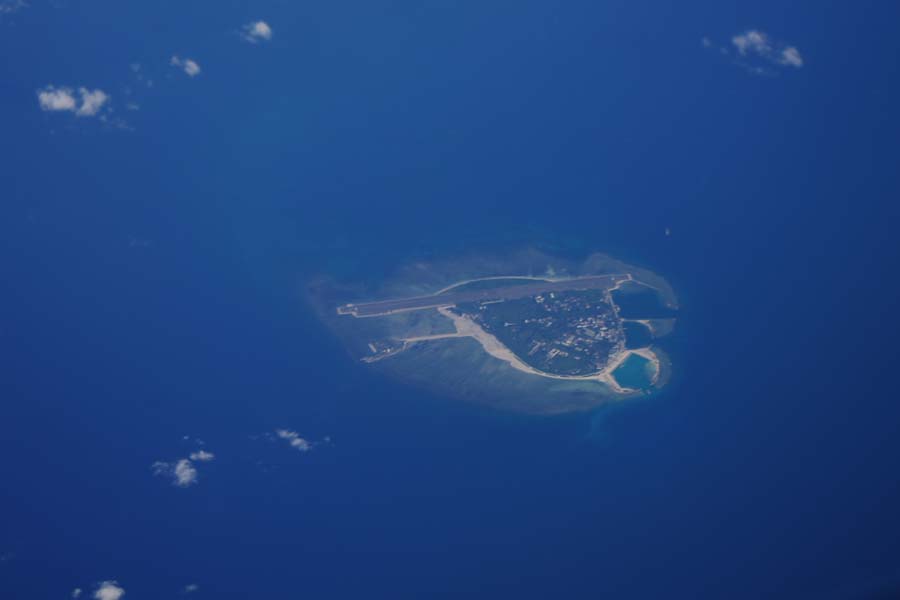
Aerial photo taken on May 26, 2021 shows the Yangpu international container port at Yangpu economic development zone in South China's Hainan province. [Photo/Xinhua]
Thanks to the joint efforts of China and ASEAN countries, the Declaration on the Conduct of Parties in the South China Sea was formally signed in Phnom Penh in November 2002. The declaration was a diplomatic initiative of special significance and a major event in the history of China-ASEAN relations as well as a successful endeavor in the history of contemporary international relations, demonstrating collective wisdom and creativity. The declaration was a product of China and ASEAN's ability to manage differences through institutions and rules-making, without outside intervention and interference.
Since its signing, the declaration, though not legally binding like an international treaty, has played an irreplaceable role for years in maintaining stability and managing differences over the South China Sea. It has become a guiding document for countries around the South China Sea to build mutual trust, stabilize the South China Sea, manage conflicts and promote cooperation. Today, the South China Sea is stable as a whole, with no turbulence caused by new occupation on islands or reefs, and steady progress in low-sensitivity fields, all of which is attributable to the declaration.
In early 1990s, I started my research career on the South China Sea. 1990s was a special and stormy period for the South China Sea, when China and ASEAN countries had not established a permanent platform for dialogue on the South China Sea, nor were there common rules for the South China Sea, still less was there a consensus on what could and could not be done in the South China Sea. Since early 1990s, I have had deep discussions and close cooperation with Hasjim Djalal, Indonesia's ambassador-at-large, on many international meetings related to the South China Sea. The Workshop on Managing Potential Conflicts in the South China Sea, a non-governmental dialogue he launched for countries in this region, played a positive role in the birth of the declaration and made valuable exploration on cooperation under the declaration framework. In this sense, we, academics from think tanks, made our contribution to the birth of the declaration and some maritime cooperation projects under the declaration framework.
In 2016, the National Institute for South China Sea Studies I work for and the Centre for Strategic and International Studies of Indonesia jointly launched China-Southeast Asia Research Center on the South China Sea, with the mission to implement the declaration and push for progress in the COC consultations. In the future, the wisdom and strengths of think tanks and academics are indispensable for implementation of the declaration, progress of the COC consultations, establishment of confidence-building measures, and conduct of preventive diplomacy on the South China Sea.
China and ASEAN are important neighbors, largest trading partners and comprehensive strategic partners to each other. Although not the whole of China-ASEAN relations, the South China Sea issue is so sensitive that, if mishandled, will affect bilateral relations. External forces can also seize or leverage this issue to drive a wedge between China and ASEAN. It is a major issue in China's diplomacy on the South China Sea to prevent it from affecting China-ASEAN relations and to "deleverage" it in China-US relations. At present, China and ASEAN countries are at the crossroads of the COC consultations, facing the risk of backsliding if negotiations are stalled for too long. Article 10 of the declaration has made the adoption of the COC as a clear and ultimate goal. Failure in the COC consultations will not only mean incomplete implementation of the declaration, but also affect political mutual trust between China and ASEAN countries. Unilateral actions on the South China Sea issue will disrupt the relations between China and other claimants.
The South China Sea will once again become an arena for great power competition.
From my perspective, the only way to avoid the above-mentioned possibilities is to take a more practical approach to maritime cooperation under the declaration framework, while moving faster in building rules and security mechanisms in the South China Sea through the COC consultations, with the ultimate aim of enduring peace and stability in the South China Sea. The COC consultations are a joint mission for China and the 10 ASEAN countries; the formulation of the COC will help realize stable China-ASEAN relations in the long run; and consensus on the COC will make the stakeholders of the South China Sea issue beneficiaries. At this stage, we need to aim at increasing mutual trust, building consensus, and seeking common ground while reserving differences in the COC consultations. In a sense, formulating the COC is like members of a big family setting rules of conduct by themselves to restrain themselves. High-level and candid consultations cannot move forward without mutual trust. Consensus is the logical starting point and necessary condition for building a multilateral mechanism. Without consensus, when you want to move forward, others may go the opposite way. Therefore, the COC consultations will not be substantive without consensus. With different strategic considerations, interests and requests among the 11 countries on the South China Sea issue, it is inevitable for them to argue and even quarrel with each other. In this case, "seeking common ground while reserving differences" as well as necessary concessions or compromises are both the art of diplomatic negotiation and the "rules of procedure" to advance the consultations.
In short, the declaration implementation and the COC consultations are the only choice for China and ASEAN countries to build a beautiful home together in the South China Sea. Only by forging ahead toward the shared goal and overcoming difficulties will we successfully conclude the COC consultations.
This is the remarks at the Conference Commemorating the 20th Anniversary of the Signing of the DOC.
WU Shicun is the Founding President of China's National Institute for South China Sea Studies and Chairman of China-Southeast Asia Research Center on the South China Sea.
The opinions expressed here are those of the writer and do not necessarily represent the views of China Daily and China Daily website.
If you have a specific expertise, or would like to share your thought about our stories, then send us your writings at opinion@chinadaily.com.cn, and comment@chinadaily.com.cn.







 Overview
Overview Resources & Environment
Resources & Environment



 QQ 好友
QQ 好友 微信好友
微信好友 易信好友
易信好友 QQ空间
QQ空间 朋友圈
朋友圈 百度空间
百度空间